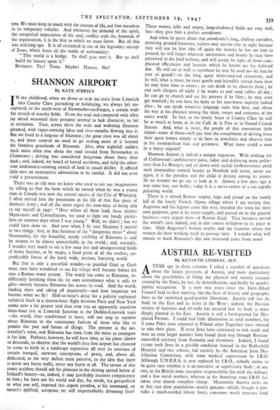SHANNON AIRPORT
By KATE O'BRIEN There was an old man we knew who used to stir our imaginations by telling us that the farm which he owned when he was a young man in Canada was now the central square of the City of Winnipeg. I often envied him the possession in his life of that fine piece of dramatic irony ; and all the more regret the near-miss of being able to say myself in 1947: "Here where all these land, these mighty Skymasters and Constellations, we used to light our lonely picnic- fires on summer days when I was young." Well, we didn't ; but we could have done so. And now when I fly into Shannon I marvel at two things : first, at that business of the "dangerous mists" about Newmarket, for the beautiful, steady visibility of Rimanna is said by airmen to be almost unmatchable in the world ; and, secondly, I wonder very much to see a few once lost and unsequestered fields of home become, as by magic, a focal point of all the restless, un- predictable forces of the hard, wide, anxious, hurrying world.
But that is only a parochial wonder—as puzzled Gaul or Goth must once have wondered to see his village well become before his eyes a Roman water system.. The world has come to Rimanna, in- differently lavishing there foi its own convenience what it calls its gifts—merely because Rimanna lies across its road. And the world, landing there and taking off impatiently—and how impatient we become when we fly! Half-an-hour's delay for a politely explained technical hitch in a sixteen-hour flight between Paris and New York seems now a far greater trial than ever was an apparently causeless three-hour rest at Limerick Junction in the Dublin-Limerick train —the world, thus conditioned to haste, will not stop to surmise about Rimanna in the ruminatory fashion of those who like to ponder the past and future of things. The present is the air- traveller's tense, and Rimanna has risen from the mists to conjugate it for him. Perforce, however, he will have time, as his plane climbs or descends, to observe that the world's first free airport has chanced to come to birth in a landscape expressive all over its contours of certain tranquil, outworn conceptions of peace, and, above all, dedicated, as the very dullest must perceive, to the idea that there is never any hurry really, never any hurry at all. The savour of this ironic accident should salt his pleasure in the shining spread below of Ireland's beauty—as, indeed, it may justifiably increase complacency in him ; for have not his world and day, his needs, his geo-politics or what you will, imposed this urgent paradox, at his command, on nature's nplifted, acceptant yet still imperturbably dreaming face?
These waters, hills and empty, long-shadowed fields are very well, but—they give him a perfect aerodrome.
And when he paces about that aerodrome's long, shallow corridors, pestering ground-hostesses, waiters and anyone else in sight because they will not let him take off again the minute he has set toot to ground, he will forget whatever ancientness and beauty he may have perceived in the land without, and will accept by right all those com- plicated efficiencies and luxuries which he knows are his habitual due. He will eat as well ;s anywhere he may be used to—let him be ever so grandl—in the long, quiet white-and-red restaurant, and he will, what is more, be more gently and friendlily served there than he may have time to notice ; he can drink as he chooses there ; he can cash cheques all night if he wants to and send cables all day ; he can go to church and say his prayers if he likes ; he may even get married ; he can have his baby or his race-horse expertly looked after ; he can speak whatev.tc language suits him best, and elbow his way at his pleasure among the skins, voices and costumes of the entire world. In fact, in the lonely heart of County Clare he will be as much at home as in the Café de la Paix or in Grand Central Station. And, what is more, the people of this convenient little island—some of them—will pay him the compliment of driving from their quiet homes simply to sit here in armchairs and observe him in his cosmopolitan fuss and greatness. What more could a man in a hurry require?
Shannon Airport is indeed a unique organism. With nothing yet of Collinstoun's architectural poise, tidier and deploying more polite- ness than Le Bourget, and set down with tactful inoffensiveness amid such immaculate natural beauty as Northolt will never, never see again, it is the paradox and the child of destiny among its sisters. So no wonder we go out to look at it. Almost a few days ago it was some lost, wet fields ; today it is a nerve-centre of a too rapidly pulsating world.
There is a mined Roman trophy, high and proud on the lonely hill of the lonely French Alpine village where I am writing this. Augustus and his legions came this way, founded the town for their own purposes, gave it its water-supply, and passed on to the general business—very urgent then—of Roman Gaul. That business served the world's turn indeed, and in due course withdrew to its place in time. Only Augustus's broken trophy and the fountain where the women do their washing mark its passage here. I wonder what will remain to mark Rimanna's day two thousand years from now?


































 Previous page
Previous page